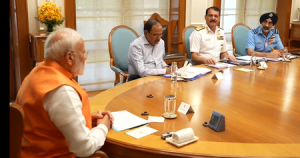IAF chief meets PM Modi amid rising tensions with Pakistan over Pahalgam attack

New Delhi: In a significant development against the backdrop of escalating tensions with Pakistan, Air Chief Marshal A.P. Singh Sunday met Prime Minister Narendra Modi at his official residence at 7, Lok Kalyan Marg, sources said.
The meeting, which went on for 45 minutes, comes in the aftermath of the brutal terror attack in Pahalgam that claimed the lives of 26 innocent civilians, including 25 tourists and a local resident.
This high-level meeting marks the second such engagement between the Prime Minister and the military leadership within 24 hours. Saturday, PM Modi held discussions with Admiral Dinesh K. Tripathi, the Chief of the Naval Staff.
These successive meetings reflect the Centre’s heightened focus on India’s security preparedness following the April 22 attack, widely attributed to Pakistan-backed terror group Lashkar-e-Taiba (LeT).
Meanwhile, the ceasefire violations by the Pakistan Army along the Line of Control (LoC) continued for the 10th consecutive day Sunday. Indian forces responded proportionately, maintaining vigilance along the tense border regions in Jammu and Kashmir.
Sources said the meeting with Air Chief Marshal Singh was part of an ongoing strategic review that also included discussions on air defence readiness and inter-service coordination for any potential response.
The engagement with Admiral Tripathi, similarly, was seen as part of broader maritime security planning and tri-service deliberations.
Earlier this week, PM Modi chaired a comprehensive meeting with the Chiefs of the Army, Navy, and Air Force, alongside Defence Minister Rajnath Singh and National Security Advisor Ajit Doval.
In the closed-door discussions, the Prime Minister is said to have given the military leadership complete “operational freedom” to determine the timing, nature, and scope of India’s response to the Pahalgam massacre.
Government sources indicated that all constraints had been removed, with the political leadership backing strong and calculated military countermeasures.
As tensions rise, the government has also initiated several economic and diplomatic measures to isolate Pakistan. Saturday, the Department of Posts under the Ministry of Communications ordered the suspension of all mail and parcel exchanges with Pakistan via both air and surface routes.
This came shortly after India imposed a total ban on all imports from Pakistan, barred Pakistani vessels from Indian ports, and prohibited Indian ships from docking at Pakistani ports.
Further, India has announced the closure of the Attari-Wagah border crossing, suspended all cultural and trade exchanges, initiated the deportation of Pakistani nationals from its territory, and placed the Indus Water Treaty in abeyance.
The government has also shut its airspace for Pakistani commercial aircraft.
The cumulative measures reflect India’s resolve to hold Pakistan accountable for its alleged support of terrorism.
Prime Minister Modi, in his first public reaction to the killings in Pahalgam, said, “The terrorists, their handlers, and their backers will be chased and hunted down to the ends of the earth.”
The Pahalgam massacre carried out in the Baisaran meadow April 22 saw 26 civilians, including one Nepal national, brutally killed in an attack that has drawn widespread national outrage and international condemnation.
IANS
News